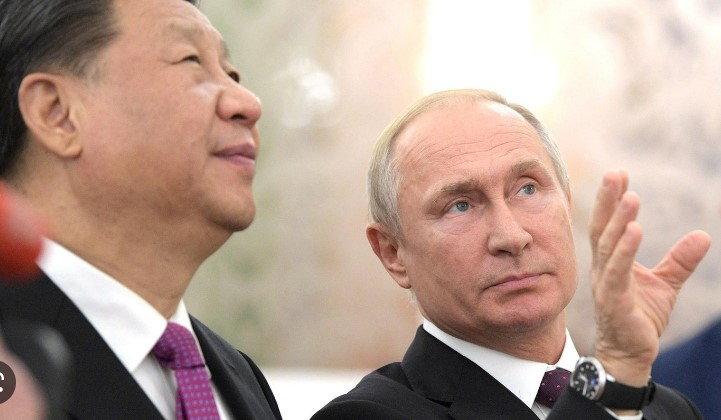Virendra Pandit
New Delhi: In the fast-changing geopolitical oneupmanship, this is the likely outcome of Chinese President Xi Jinping’s current three-day visit to Russia: with President Vladimir Putin’s prolonging misadventure of Ukraine making him all the more dependent on Beijing, the Dragon may have reduced the Polar Bear into a ‘junior’ partner.
In the 1950s, Mao Zedong’s Communist China had systematically downgraded Moscow’s hegemony in the world communist movement since 1917—it was precisely why the Communist Party of India (Marxist) spun off the pro-Russia CPI in the 1960s and became a China supporter.
Six decades on, Moscow, facing the Afghanistan II moment in Ukraine, the boot is on the other leg. China is now the predominant “Communist” leader, and a post-Communism Russia is its protege!
Weeks before Russia invaded Ukraine on February 24, 2022, Presidents Putin and Xi Jinping had cemented their partnership “without limits.” By supporting Russia in the United Nations and other forums—but without supplying any weapons!—China has successfully dwarfed Russia’s global position and made it excessively dependent on Beijing.
The West, led by the US, has also pushed Russia into China’s trap by simply weaponizing Ukraine to prolong Russia’s hemorrhage in a rather undefended country Russia thought it would defeat in 48 or 72 hours. Because of its miscalculations, the Russian forces have terribly burnt themselves in eastern Ukraine. Moscow has lost thousands of tanks and personnel carriers, most of them in the disastrous early days of the conflict when Western-supplied drones and anti-armor missiles devastated Putin’s armor forces. Today’s Ukraine is as much a graveyard of itself as it is of Russia’s revanchist ambitions to resurrect the dead Soviet Union.
Despite Putin’s efforts to get more effective weapons, China is unlikely to oblige, fearing the West’s instant reaction in its own neighborhood, says Taiwan. Moscow, therefore, is likely to sink further in Kyiv, desperately hoping for a lifeline from Beijing.
More than in Ukraine, Russia has lost its ‘superpowerdom’ in other countries, as it seeks China to support its narrative justifying the Ukraine invasion. While the US, European Union, NATO, and Western-oriented nations like Australia, Japan, and South Korea are strongly aligned against Russia, others like India, South Africa, and Brazil are not exactly Moscow-friendly on this count.
As Putin grabbed all power in Russia, Xi has done likewise: he is now the Chairman of the Central Military Commission, the President of China, and also the General-Secretary of the Chinese Communist Party—not necessarily in that order. Like Mao Zedong, Xi’s “thoughts” form part of the curriculum for students in China.
Unlike Putin, who operates more on neuroses than logic, Xi is a patient tactician who is using Russia more than Moscow is using Beijing. So, without giving anything substantial like weapons to Russia except “support”, China is buying discounted Russian oil, natural gas, and minerals to revamp its post-Covid economy and regain its geopolitical position.
For the consumption of the world, Xi is pushing China’s “12-point peace plan” for Ukraine as a basis for negotiations and probably assure Putin that China would not support a return to pre-2014 borders — meaning Russia would continue to control Crimea and a slender land bridge from there to Russia proper.
Putin also seems aware of this Chinese strategy. That is why he is seeking a tactical pause in operations so as to obtain more arms and munitions from Iran, North Korea, and Pakistan, if possible.
President Xi may be testing Russia in Ukraine, the way Moscow could test Beijing later in Taiwan!

